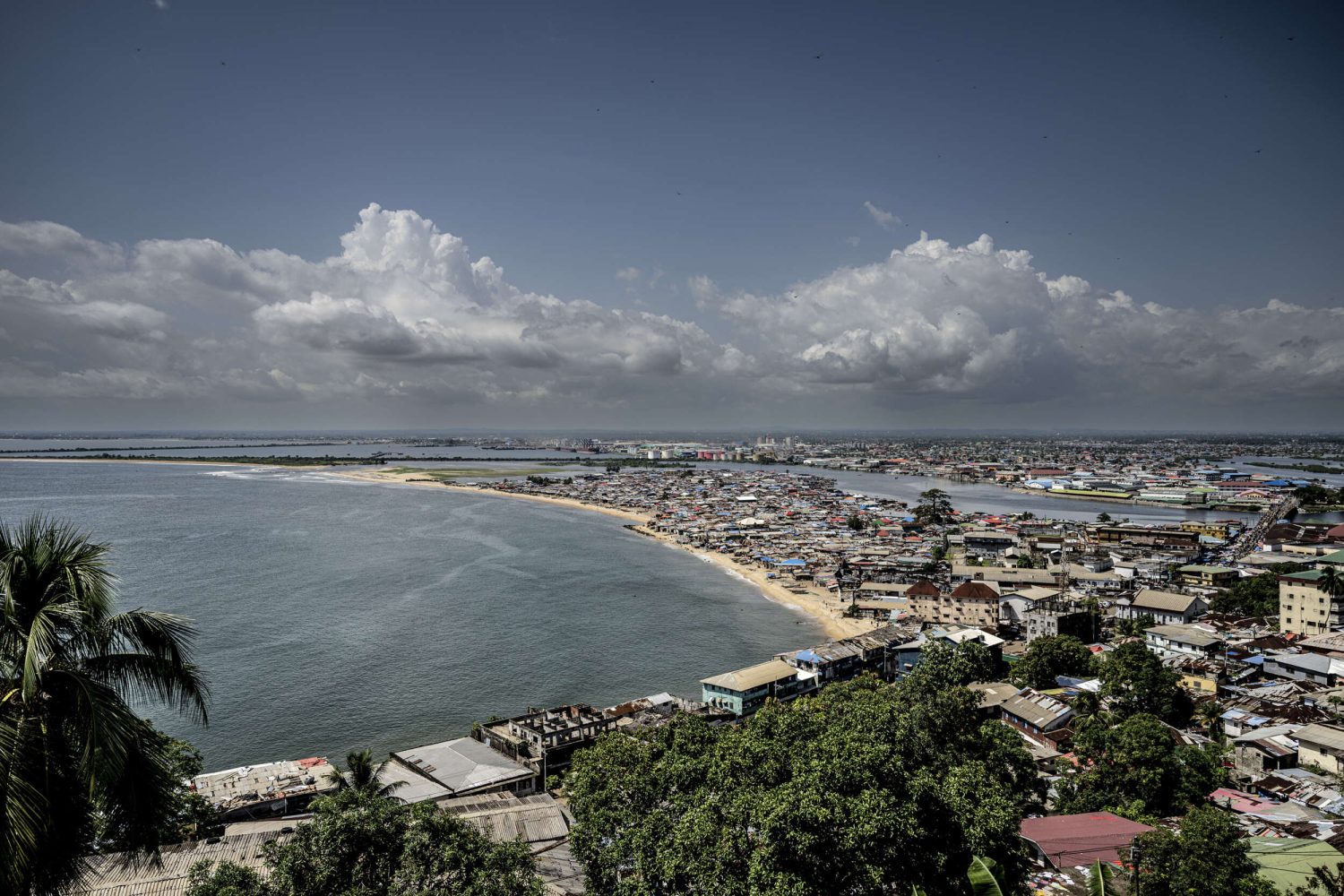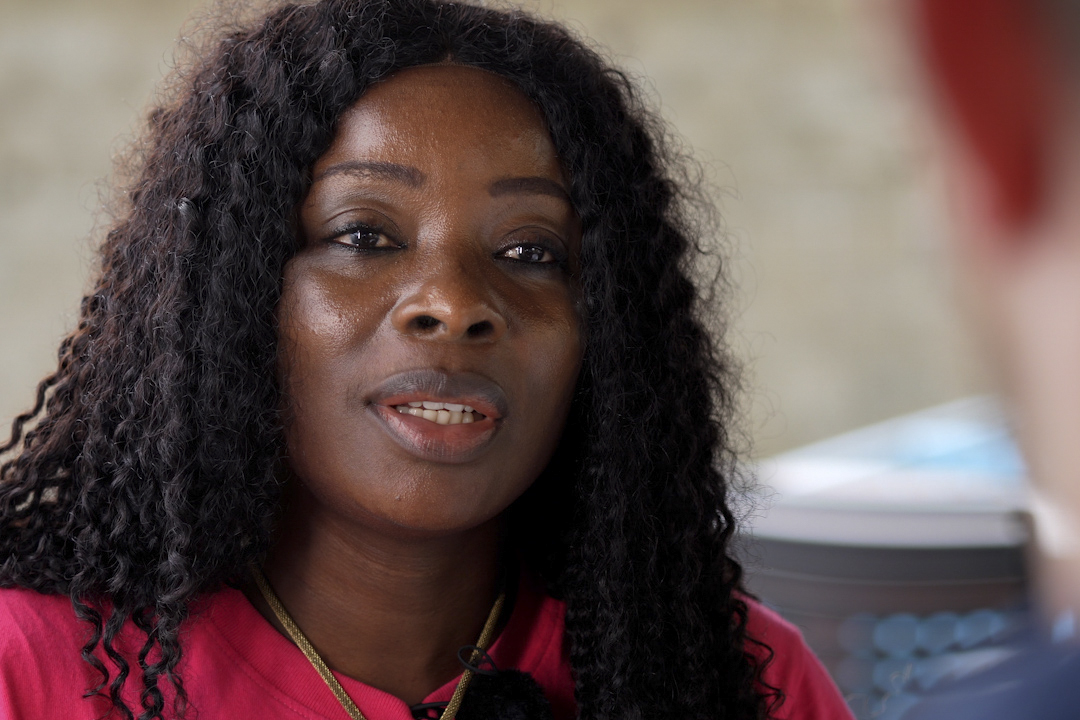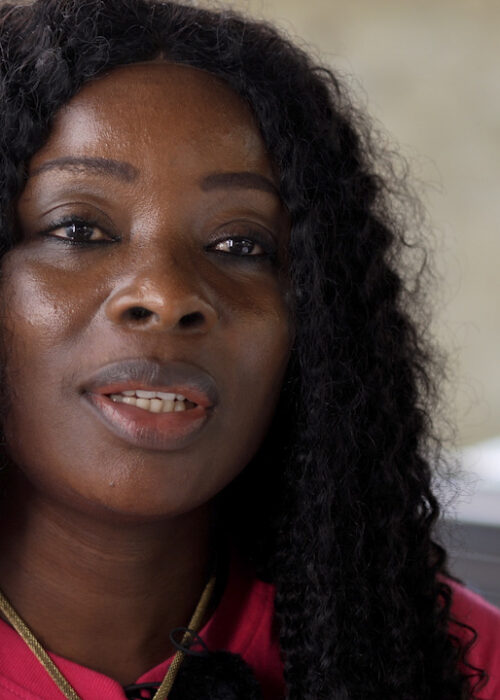
En Danwatch-undersøgelse
Maersk employees in Liberia work in highly problematic conditions
MONROVIA – When it was built in 1960, the Ducor Hotel in Liberia’s capital, Monrovia, was the most luxurious hotel in Africa. Five stars, eight floors, 106 rooms, a pool, tennis courts, a bar, a French restaurant and, of course, the right kind of guests.
It is said that Uganda’s long-serving president Idi Amin once swam in the pool while holding a gun in his hand. Today, almost twenty years after the end of Liberia’s second civil war, the hotel remains as a looted ruin.
Only the phenomenal view from the hotel is left preserved.
From the top floor of the hotel the view sweeps for miles.
To the west, lies the rolling expanse of the Atlantic. To the east, you can see The Executive Mansion, the office of President George Weah, and the milk-white buildings of the United Nations. To the north, are the canyons of West Point, one of Monrovia’s densely packed slums, and further out to the horizon is The Freeport of Monrovia, the capital’s major port, where three large container ships are docked on a humid afternoon in late May.
Down at the port, Ballah Kpadeh works. A short man in his mid-40s with large sunglasses glued on his face.
He is employed as a truck driver for Maersk’s port company APM Terminals, which in 2010 was awarded a lucrative 25-year contract to operate the Freeport of Monrovia.
Danwatch and Ekstra Bladet met with Ballah Kpadeh and a number of his current and former colleagues in Monrovia, while investigating how Maersk runs port operations in one of the world’s poorest countries.
We have documents proving systematic wage issues and dismissals that are in violation of Liberia’s labour laws.
In addition, seven current and seven former Maersk employees have chosen to come forward with their stories, about substantial cement dust contamination, futile health insurance and the harassment of employees involved with the union.

Who are APM Terminals
APM Terminals is 100 percent owned by Maersk A.P. Møller – Maersk.
In February this year, the group made a record profit in Danmark of 118 billion Danish Krone after tax.
Never before has a Danish company yielded such great results.
A.P. Møller – Maersk employs more than 80,000 people in over 80 countries.
“APM Terminals make a lot of money from running the port, but they don’t care about us workers who do the actual work,” says Ballah Kpadeh, who is also a union representative for the port workers.
Danwatch and Ekstra Bladet have presented the port workers situation to Karsten Kristensen, vice-president of 3F Transport, who serve Danish port workers.
He describes the conditions at the port of Monrovia as “appalling”.
“It’s shameful. Maersk knows how to treat its employees. We can clarly see that in Denmark, but abroad they are operating at the lowest common denominator. It is disappointing to see”, he tells Danwatch and Ekstra Bladet.
Maersk did not wish to be interviewed by Danwatch and Ekstra Bladet, but acknowledges that there are “discrepancies” at APM Terminals in Liberia.
However, they rejected several of the more specific criticisms.
In an email, press officer Signe Wagner writes:
“At Maersk, we are aware that there have been disputes in the port of Monrovia and we are cooperating with the unions and authorities to resolve them,” she writes.

Long-lasting problems
The port of Monrovia is by far Liberia’s most important form of infrastructure.
“The Gateway to Our Economy,” reads a sign at its heavily guarded entrance.
Behind the green walls that separate the port area from one of the capital’s busy access roads, container ships arrive and depart in a constant stream.
Rice, electronics, oil and building materials, are shipped in while rubber, iron ore, palm oil and timber are shipped out.
These problems at the port did not arise overnight.
In March 2018, employees walked off the job frustrated with their working conditions.
They were angry about wide-ranging issues, including a lack of pay rises and a reduction to their health insurance.
A year and a half later, in September 2019, several of the workers who were on strike were fired which was in direct violation of Liberia’s labour bill, Decent Work Act 2015
This is stated in documents sent to APM Terminals Liberia from the Ministry of Labour, which Danwatch and Ekstra Bladet have obtained.
And a year later, in September 2020, a large group of workers – supported by the Dock Workers Union of Liberia (DOWUL) – went on a three-day strike in protest over issues including their pay and health insurance.
This incident led to the DOWUL union, the Ministry of Labour and APM Terminals Liberia signing an agreement – the first step towards ending the unrest at the port.
But today, ten months after signing the agreement, employees are calling for tangible action.
Their working conditions are still deeply unsatisfactory, according to those who met with Danwatch and Ekstra Bladet in Monrovia.
“At most, there has been a 0.5 percent improvement, nothing more. All our problems still persist”, says Ballah Kpadeh
“I’d rather be a free, hungry man than a slave”
By the end of 2021, Soko Kromah had had enough.
Danwatch and Ekstra Bladet met with him in his home, just a few dark rooms above a small shop selling biscuits and mobile data.
The ceiling hangs in tatters and drips with condensation. It’s the wet season and the air is so thick you can cut it with a knife.
The room’s stone floor is bordered by a rusty freezer, cans of cooking oil and a stack of Monrovia Brewery cases.
45-year-old Soko Kromah lives in New Kru Town, a township on Bushrod Island, north of Monrovia’s city centre.
In 2014, the island was devastated by the Ebola epidemic. People were holed up in their homes while international medical teams went from house to house collecting infected people for treatment.
Now the streets are full of cars, motorcycles and kekehs, Liberia’s electrically-powered rickshaws, all constantly honking, and swerving to avoid the huge puddles which have appeared from the thunder storms during the night.
Maersk employees have had enough
Danwatch and Ekstra Bladet have met several current and former employees at the port of Monrovia. Fourteen of them have agreed to come forward with their names and identities. Meet them here.




























Soko Kromah was hired to drive a forklift at the port in 2011. At first, he was happy with his job. It was something to get out of bed for and he got a fixed salary.
But over the years he became frustrated, and six months ago he faced the consequences of quitting his job without something else lined up.
Today he makes a living by renting out his car, while dreaming of a future in Europe, hopefully France. Times are hard in the small home in New Kru Town, where he is the sole breadwinner for ten family members, but as he says:
“I would rather be a free, hungry man than a slave.”
During his time at APM Terminals, Soko Kromah was particularly frustrated by the pay, and he was not alone.
All of the port workers that Danwatch and Ekstra Bladet have talked to have individually expressed that they were cheated each year for the equivalent of a month’s salary.
And this has been confirmed by Augustus Payne Tarr, long-time IT manager of APM Terminals in Liberia, and is backed up by various legal documents, pay slips and statements, letters of employment and employee handbooks, which Danwatch and Ekstra Bladet have obtained.
“APM Terminals think people are so stupid in Liberia that they can get away with anything,” says Payne Augusts Tarr, who during his time at APM Terminals was a permanent member of the seven-man executive management team.
Educated in the US, he now owns a hotel near the Chinese embassy in Congo Town. After ten years of employment, he resigned last year to protest APM Terminal’s way of conducting business in Liberia.
“There are employees who are entitled to an extra month’s salary every December, but instead they just get paid their annual salary in thirteen instalments. APM Terminals is cheating its employees,” says Augustus Payne Tarr.
Danwatch and Ekstra Bladet were told by Maersk’s press officer Signe Wagner that the company is aware of the dispute. However, she denies that Maersk owes money to its employees.
“We have sought advice on this from an external independent auditor and we await their conclusions,” she writes in an email.
Plagued by cement dust contamination
One of APM Terminal’s major clients at the Port of Monrovia is Liberia Cement Corporation (CEMENCO). The company is among the largest in the country. It is responsible for all procurement, processing and sale of cement in Liberia.
The cement ships are foregrounded by all the current and former APM Terminals employees Danwatch and Ekstra Bladet met in Monrovia. The ships are responsible for the port being plagued by extensive cement dust pollution, each worker stresses.
Danwatch and Ekstra Bladet have received photographs and video footage clearly showing how the dust hangs in the air and obscures visibility.
We are not aware of any employees being injured or becoming unwell as a result of their work unloading cement.
Signe Wagner, head of communication, Mærsk
CEMENCO imports cement in a powdered form, which means that when their ships need to be unloaded, dust covers the port area. The dust goes straight into the worker’s eyes, ears and nose, especially for the employees who perform their tasks on the quay.
One of them is crane operator Alexander Vinton, 42, who has worked at the port since 2017. Sweat beads on his smooth head, and his eyes are locked in a contemptuous stare while he recounts with Monrovia’s crashing Atlantic waves in the background.
“My health has deteriorated since I started working at the port. My eyes burn and my breathing is laboured,” he says.
“When I’m up in the crane, it gets so hot that I have to open the window and the cement dust flies straight in.”

How we did it
- In cooperation with Ekstra Bladet and the local media outlet Voice of Liberia, Danwatch has been in Monrovia to investigate the working conditions at Maersk’s port company APM Terminals.
- Conducting over twenty interviews with former and current employees, Liberian politicians, lawyers and relevant experts, we have identified a number of problematic issues at the port in the country’s capital Monrovia.
- During which reams of internal company documents as well as government papers have come into our possession.
- Seven current and seven former employees have chosen to come forward exposing both their names and identities.
- Danwatch and Ekstra Bladet met with them in Monrovia and have permission to use their stories.
- We have also been in contact with employees who only wanted to speak with us off the record.
- Danwatch and Ekstra Bladet submitted the employees’ criticism to Maersk.
- The company did not want to be interviewed, but sent us an email in response.
APM Terminals employees do not believe that they are supplied with adequate protective equipment or that the health insurance the company has provided them covers adequate treatment. However, Maersk does not acknowledge these issues.
“All employees, regardless of who they are employed by, are required to wear full safety equipment, which is provided for them. We are not aware that any employees have been injured or have become unwell due to their work unloading cement,” writes press officer Signe Wagner in an email to Danwatch and Ekstra Bladet.
Jane Frølund Thomsen, senior physician at the occupational and environmental medicine department at Bispebjerg Hospital, has seen videos of the dust at the harbour and has been presented with the testimonies of the employees.
Her assessment is clear:
“There is a risk of eye and lung damage. Especially in the long term. Lung disease does not happen overnight, but if you are surrounded by dust day after day, year after year, you risk getting bronchitis and potentially even silicosis”, she told Danwatch and Ekstra Bladet.
Fear and threats
APM Terminals’ employees in Liberia are now speaking up. In an email, Maersk writes that it respects the right of its employees “to freely go through the trade unions of their choice”.
But those Danwatch and Ekstra Bladet have spoken have individually stated that there is a history of out spoken employees at the port of Monrovia being threatened and discriminated against.
That’s why it hasn’t been an easy decision to come forward with his story, says electrician Willie Gbappy. He’s in his mid-30s, sitting in a plastic chair in a grey polo outside his house, a matchbox, in the Monrovia suburb of Johnsonville.
He dampens his forehead with a small towel.

“We have been told not to talk to journalists. Management doesn’t want us to talk about our working conditions. But I’m coming forward anyway because it’s time people understood what we go through to do our jobs,” he says.
Truck driver Ballah Kpadeh is an employee who has repeatedly clashed with management. Danwatch and Ekstra Bladet obtained a letter from APM Terminals to the Liberian government, in which the company complains about Ballah Kpadeh.
The letter, sent to the Ministry of Labour in September 2020 – the same month a Ballah Kpadeh helped organise the strike – says he “has done everything he can to destroy the company’s reputation and create unrest in the workplace”.
But Ballah Kpadeh is not intimidated. Change at the port requires courage. Someone has to be at the forefront, he says.
“We are ready to die for better working conditions. Our people deserve better.”
Meanwhile, from the top of the Ducor Hotel’s musty ruin, you can see one set of containers after another being sailed towards Freeport of Monrovia’s harbour basin.
The shipping traffic is endless – just like the frustration of the dockers.
